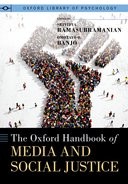 The Oxford Handbook of Media and Social Justice
The Oxford Handbook of Media and Social Justice
Contents
-
-
-
-
-
-
-
-
-
The Case for Critical Media Effects The Case for Critical Media Effects
-
Critical Media Effects: Intellectual Foundations Critical Media Effects: Intellectual Foundations
-
The Critical Media Effects Framework: Roadmap, Central Pillars, and Salient Examples The Critical Media Effects Framework: Roadmap, Central Pillars, and Salient Examples
-
Power and Critical Media Effects Power and Critical Media Effects
-
Intersectionality and Critical Media Effects Intersectionality and Critical Media Effects
-
Context and Critical Media Effects Context and Critical Media Effects
-
Agency and Critical Media Effects Agency and Critical Media Effects
-
Charting the Terrain Ahead: Implications and Future Directions Charting the Terrain Ahead: Implications and Future Directions
-
Acknowledgments Acknowledgments
-
Notes Notes
-
References References
-
-
-
-
-
-
-
-
-
-
-
-
-
-
-
-
-
4 Critical Media Effects Framework: Bridging Critical Cultural Communication with Media Effects Through Power, Intersectionality, Context, and Agency
Get accessSrividya Ramasubramanian (PhD, Penn State University) is Newhouse Professor & Endowed Chair at Syracuse University. She is widely recognized for her pioneering work on data justice, critical media effects, media literacy, and anti-racism dialogues. With Erica Scharrer, she has co-authored Quantitative Research Methods in Communication: The Power of Numbers for Social Justice (Routledge, 2021). She is the editor of Communication Monographs and the Director of CODE^SHIFT (Collaboratory for Data Equity, Social Healing, Inclusive Futures, and Transformation).
Omotayo O. Banjo (PhD, Pennsylvania State University) is a Professor in the School of Communication, Film, & Media Studies as well as Associate Dean of the Grad College at the University of Cincinnati. Her work focuses on African diasporic entertainment, identity, and belonging. She is a critical media effects scholar who has used different methodologies from textual analysis of post-racial entertainment media to transnational audience reception research and co-viewing effects. She is a McNair alum, a Fulbright award winner, and engaged scholar, having presented her work to policymakers and tech experts.
-
Published:19 September 2024
Cite
Abstract
This chapter advances the Critical Media Effects (CME) framework as a way of bridging two major subfields of communication that seldom speak to one another: media effects scholarship and critical cultural communication. CME is situated within the dominant mode of social scientific theorizing within media effects scholarship and draws on four key interrelated concepts from critical cultural communication: power, intersectionality, context, and agency. CME advocates for greater reflexivity, rigor, and nuance in theorizing about media effects to better respond to the complexity and dynamicity of emerging global sociopolitical mediated contexts. Recommendations, salient examples, and future directions for co-creating a shared research roadmap for CME are discussed. Through this work of bridging, the goal is to promote more collaborative partnerships, productive engagement, and mutual solidarity across these two important subfields to address the most pressing social issues and challenges of the world today.
Sign in
Personal account
- Sign in with email/username & password
- Get email alerts
- Save searches
- Purchase content
- Activate your purchase/trial code
- Add your ORCID iD
Purchase
Our books are available by subscription or purchase to libraries and institutions.
Purchasing information| Month: | Total Views: |
|---|---|
| September 2024 | 4 |
| October 2024 | 7 |
| November 2024 | 5 |
| December 2024 | 3 |
| January 2025 | 4 |
| February 2025 | 5 |
| March 2025 | 10 |
| April 2025 | 10 |
Get help with access
Institutional access
Access to content on Oxford Academic is often provided through institutional subscriptions and purchases. If you are a member of an institution with an active account, you may be able to access content in one of the following ways:
IP based access
Typically, access is provided across an institutional network to a range of IP addresses. This authentication occurs automatically, and it is not possible to sign out of an IP authenticated account.
Sign in through your institution
Choose this option to get remote access when outside your institution. Shibboleth/Open Athens technology is used to provide single sign-on between your institution’s website and Oxford Academic.
If your institution is not listed or you cannot sign in to your institution’s website, please contact your librarian or administrator.
Sign in with a library card
Enter your library card number to sign in. If you cannot sign in, please contact your librarian.
Society Members
Society member access to a journal is achieved in one of the following ways:
Sign in through society site
Many societies offer single sign-on between the society website and Oxford Academic. If you see ‘Sign in through society site’ in the sign in pane within a journal:
If you do not have a society account or have forgotten your username or password, please contact your society.
Sign in using a personal account
Some societies use Oxford Academic personal accounts to provide access to their members. See below.
Personal account
A personal account can be used to get email alerts, save searches, purchase content, and activate subscriptions.
Some societies use Oxford Academic personal accounts to provide access to their members.
Viewing your signed in accounts
Click the account icon in the top right to:
Signed in but can't access content
Oxford Academic is home to a wide variety of products. The institutional subscription may not cover the content that you are trying to access. If you believe you should have access to that content, please contact your librarian.
Institutional account management
For librarians and administrators, your personal account also provides access to institutional account management. Here you will find options to view and activate subscriptions, manage institutional settings and access options, access usage statistics, and more.